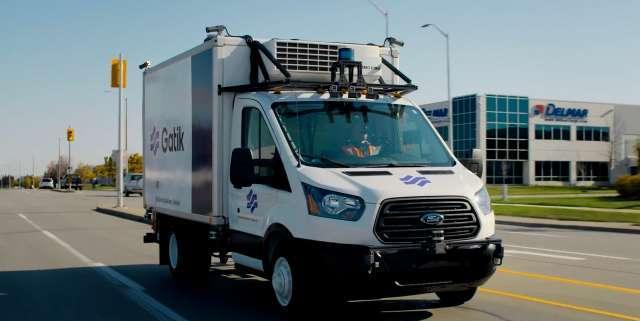On Tuesday, February 7, local time, the founder of Gatik, a self-driving car startup in the United States, was interviewed and said that after cooperating with retail giant Walmart at the end of last year, the company plans to speed up the operation process of driverless trucks in the next few years.

According to reports, Gatik is the first company to achieve fully unmanned driving on public roads in a commercial capacity. Gatik is different from other self-driving delivery companies — instead of delivering directly to shoppers, it uses self-driving trucks to transport goods from large distribution centers to retail outlets. This kind of fixed, repetitive and short-distance transportation is precisely the key link in the distribution system.
For example, in Bentonville, Arkansas, Arkansas, where Walmart is headquartered, Gatik provided Walmart with two self-driving vans to transport goods back and forth on a fixed route of 11.4 kilometers.
The company has also developed proprietary software for autonomous driving systems, a hybrid of classical robotics and machine learning-based algorithms. In addition, its trucks are equipped with a 360-degree field of view sensor, which greatly improves safety and performance.
In recent years, the COVID-19 pandemic has led to a surge in online consumption and a surge in interest in unmanned trucking. The sheer volume of orders puts more pressure on retailers — instead of relying on large distribution centers that are hours' drive away from large distribution centers that are hours' drive away, retailers are setting up small distribution stations around their stores.
As a result, more truck drivers are needed to keep logistics running. "As of last year, local trucking required an average of more than 60,000 additional drivers," said Naran, CEO and co-founder of Gatik, "and by 2030, that number will grow to as many as 160,000." ”
The U.S. is facing a shortage of truck drivers due to the labor loss and unstable work environment caused by the COVID-19 pandemic. Naran said that using automated driving can not only solve the shortage problem, but also cut logistics costs by up to 35%, which can be described as killing two birds with one stone.
Driven by the environment and technology, Gatik's company has expanded rapidly. Currently, the company has a fleet of 25 self-driving trucks and has pilot projects with Louisiana, Walmart in Arkansas, and Loblaw Cos. in Ontario, Canada. Last year, it also leveraged new investments to expand its operations into Texas.
With a focus on short-haul trucking services, Gatik was able to commercialize in 21 U.S. states that allow driverless driving. The company expects relevant federal policies to be passed in the coming years to pave the way for interstate autonomous driving. This may lead to a boom in self-driving truck services, accompanied by more fierce competition.
Gatik's current U.S. competitor is TuSimple, which last year tested a semi-trailer truck on a highway in Arizona. There's also Aurora, which has partnered with Volvo to develop self-driving trucks, and Waymo, an Alphabet subsidiary that works with United Parcel Services (UPS).
(Editor: Kim Ri-wei)